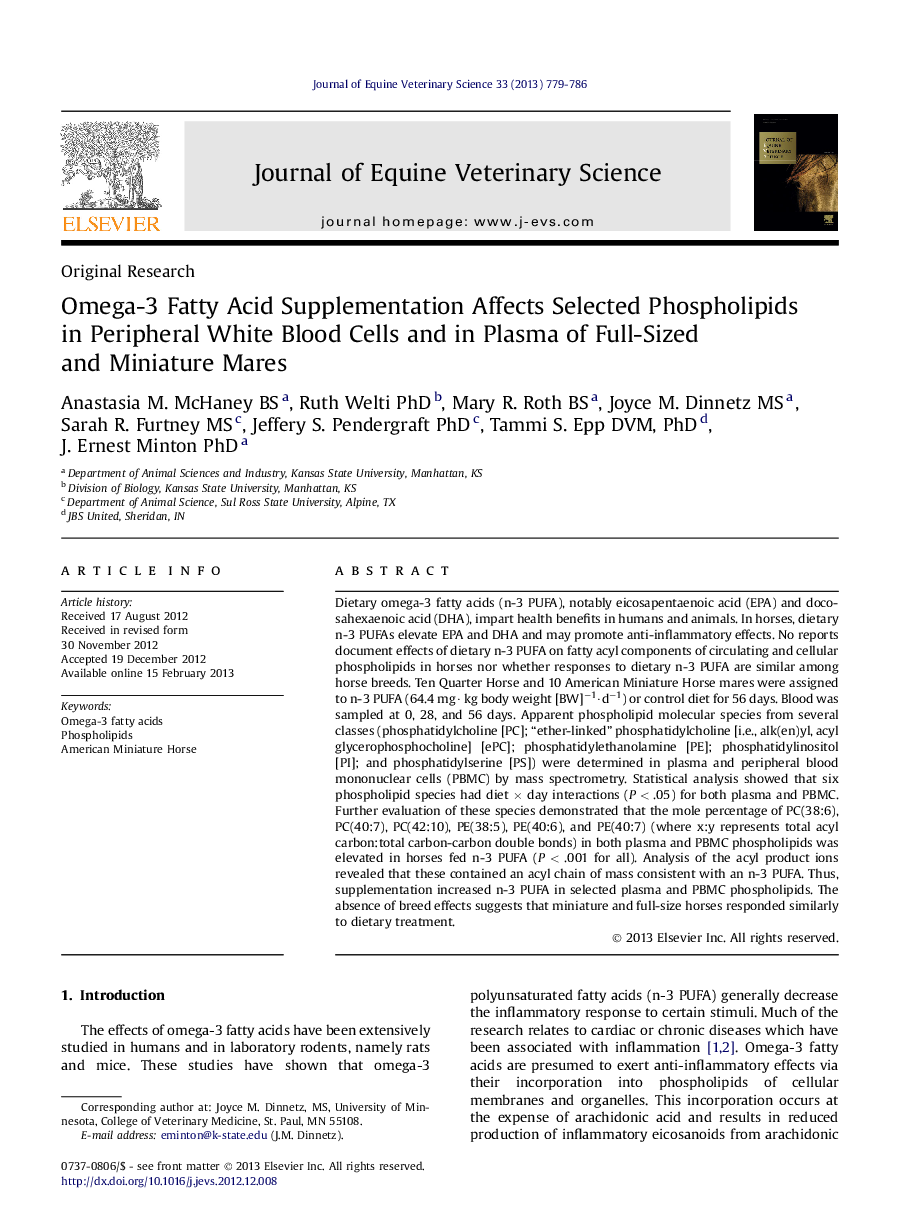| کد مقاله | کد نشریه | سال انتشار | مقاله انگلیسی | نسخه تمام متن |
|---|---|---|---|---|
| 10961561 | 1101568 | 2013 | 8 صفحه PDF | دانلود رایگان |
عنوان انگلیسی مقاله ISI
Omega-3 Fatty Acid Supplementation Affects Selected Phospholipids in Peripheral White Blood Cells and in Plasma of Full-Sized and Miniature Mares
ترجمه فارسی عنوان
مکمل اسید چرب امگا 3 بر روی فسفولیپید های انتخابی در سلول های خون سفید محیطی و در پلاسمای جنین های کامل و مینیاتوری تاثیر می گذارد
دانلود مقاله + سفارش ترجمه
دانلود مقاله ISI انگلیسی
رایگان برای ایرانیان
کلمات کلیدی
اسیدهای چرب امگا 3، فسفولیپید ها، اسب مینیاتور آمریکایی،
موضوعات مرتبط
علوم زیستی و بیوفناوری
علوم کشاورزی و بیولوژیک
علوم دامی و جانورشناسی
چکیده انگلیسی
Dietary omega-3 fatty acids (n-3 PUFA), notably eicosapentaenoic acid (EPA) and docosahexaenoic acid (DHA), impart health benefits in humans and animals. In horses, dietary n-3 PUFAs elevate EPA and DHA and may promote anti-inflammatory effects. No reports document effects of dietary n-3 PUFA on fatty acyl components of circulating and cellular phospholipids in horses nor whether responses to dietary n-3 PUFA are similar among horse breeds. Ten Quarter Horse and 10 American Miniature Horse mares were assigned to n-3 PUFA (64.4 mg· kg body weight [BW]â1·dâ1) or control diet for 56 days. Blood was sampled at 0, 28, and 56 days. Apparent phospholipid molecular species from several classes (phosphatidylcholine [PC]; “ether-linked” phosphatidylcholine [i.e., alk(en)yl, acyl glycerophosphocholine] [ePC]; phosphatidylethanolamine [PE]; phosphatidylinositol [PI]; and phosphatidylserine [PS]) were determined in plasma and peripheral blood mononuclear cells (PBMC) by mass spectrometry. Statistical analysis showed that six phospholipid species had diet Ã day interactions (P < .05) for both plasma and PBMC. Further evaluation of these species demonstrated that the mole percentage of PC(38:6), PC(40:7), PC(42:10), PE(38:5), PE(40:6), and PE(40:7) (where x:y represents total acyl carbon:total carbon-carbon double bonds) in both plasma and PBMC phospholipids was elevated in horses fed n-3 PUFA (P < .001 for all). Analysis of the acyl product ions revealed that these contained an acyl chain of mass consistent with an n-3 PUFA. Thus, supplementation increased n-3 PUFA in selected plasma and PBMC phospholipids. The absence of breed effects suggests that miniature and full-size horses responded similarly to dietary treatment.
ناشر
Database: Elsevier - ScienceDirect (ساینس دایرکت)
Journal: Journal of Equine Veterinary Science - Volume 33, Issue 10, October 2013, Pages 779-786
Journal: Journal of Equine Veterinary Science - Volume 33, Issue 10, October 2013, Pages 779-786
نویسندگان
Anastasia M. BS, Ruth PhD, Mary R. BS, Joyce M. MS, Sarah R. MS, Jeffery S. PhD, Tammi S. DVM, PhD, J. Ernest PhD,
